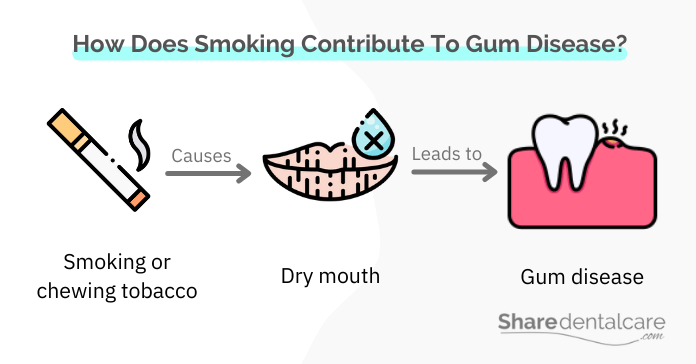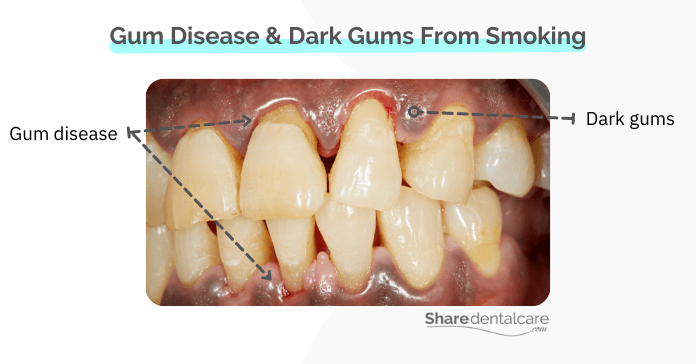Smoking not only affects your lungs but also affects your oral health. Many people don’t know that smoking tobacco can lead to gum disease, which can lead to tooth loss if left untreated. Smoking also increases the risk of dental caries (cavities). Furthermore, smokers are more likely than nonsmokers to get infections in the mouth or throat, such as oral thrush (a yeast infection). Besides, smoking can cause bad breath. This is because cigarettes contain many substances that can mix with your saliva and cause bad breath, like tar and nicotine. In this blog post, we will look at the impact of smoking on your gums and do gums heal after quitting smoking?.
How Smoking Affects Your Gums?
Smoking is a known cause of oral health problems, not to mention a range of respiratory and cardiovascular diseases. Frequent exposure to harmful chemicals can do damage to gum tissues. The nicotine from cigarettes also inhibits healing in the mouth. Here are some of the ways smoking can negatively affect your gums:
Gum Disease
Gum disease is a bacterial infection of the gums in which your gums become swollen and red, and they bleed when you brush them. It also leads to the destruction of the bones that support your teeth if it’s not treated early. With time, too much bone loss can lead to tooth loss. Signs and symptoms of gum disease include:
- Red, swollen gums.
- Gum bleeding when brushing or flossing.
- Gums tender to touch.
- Bad breath.
- Gum recession and deep pockets between teeth.
- Loose teeth and tooth loss. Read more about smoking damage to teeth.
Research has shown that smoking can increase your risk of gum disease. Smokers are almost twice as likely to get gum disease as nonsmokers, according to the CDC. This is because smoking tobacco causes dry mouth, which contributes to gum disease. Also, smoking makes it harder for your gums to heal and fight infection. Read more about gum disease from tobacco.

Smoker’s melanosis
Smoking can cause dark gums, also known as smoker’s melanosis, which is a brown to black pigmentation of the gums and oral tissue. This condition doesn’t hurt. However, it can make your smile less attractive, which causes decreased self-confidence. If you want your gums to heal and look better, quitting smoking is the best way to do this. Read more about how tobacco affects smokers teeth and gums.

Do Gums Heal After Quitting Smoking?
Yes, your gums can heal after quitting smoking. The healing process depends on how long you’ve been smoking and how much damage has been done to your gums. It can take a few weeks to several months for your gums to return to their normal color and health. During this time, it’s important to practice good oral hygiene habits, like brushing and flossing your teeth twice a day, to help the healing process.
After you quit smoking, your gums will heal, start to look better, and will be less likely to bleed. Quitting smoking is not only good for your oral health but also good for your overall health. So, if you’re looking to improve your health and gums, quitting smoking is a great place to start.
Read more about how smoking after oral surgery can interfere with the healing process.
How Long Does it Take for Your Gums to Heal After Quitting Smoking?
If you have gum disease, your gums will start to heal within a few weeks of quitting smoking if you maintain good oral hygiene. You also need to see your dentist for professional teeth cleaning. The healing process is gradual and depends on how long you’ve been smoking and how much damage has been done to your gums.
Black gums usually take from 3 months to 3 years to heal and return to their normal color after you quit smoking. If you want your gums to heal faster, then it’s best to stop smoking and see your dentist for gum bleaching. Read more about black gums from smoking treatment.
Quitting smoking is the best way to improve your oral health and heal your gums. Keep in mind that quitting smoking is not only good for your oral health, but it’s also good for your overall health.
How to Make Your Gums Heal Faster After Quitting Smoking?
There are a few things you can do to make your gums heal faster after quitting smoking, including:
- Brush your teeth twice a day with a toothbrush and fluoride toothpaste
- Floss daily to remove dental plaque from between teeth.
- Use an alcohol-free mouthwash.
- Drink plenty of water and fluids to keep your mouth moist.
- Eat a balanced diet with plenty of fruits and vegetables.
- Get your teeth cleaned by your dentist every six months.
Quitting smoking will do more than make your gums heal. It’s also good for your overall health, including improved cardiovascular health and lung function.
Read more about bleeding gums after quitting smoking.
Do Gums Heal After Quitting Smoking – Conclusion
Smoking not only affects your lung but also your oral health. Smoking can cause gum disease and smoker’s melanosis. Your gums can heal within a few weeks after quitting smoking. Also, you should improve your oral hygiene and visit your dentist every six months for professional teeth cleaning to promote the healing process. It’s important to keep in mind that quitting smoking is not only good for your oral health, but it’s also good for your overall health.